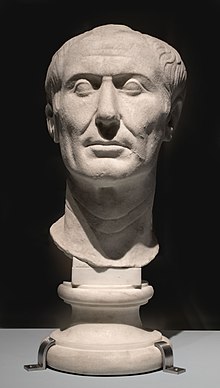
Back Гаи Иулии Цезар Abkhazian Julius Caesar Afrikaans Gaius Julius Cäsar ALS ዩሊዩስ ቄሳር Amharic Chulio César AN Gaius Iulius Caesar ANG जूलियस सीजर ANP يوليوس قيصر Arabic يوليوس قيصر ARZ জুলিয়াছ চিজাৰ Assamese
Julius Caesar | |
|---|---|
 The Tusculum portrait, possibly the only surviving sculpture of Caesar made during his lifetime. Archaeological Museum, Turin, Italy | |
| Dictator of the Roman Empire | |
| In office October 49 BC – 15 March 44 BC | |
| Lieutenant | |
| Preceded by | Sulla (82/81–81 BC; as previous Dictator) |
| Succeeded by | Augustus (27 BC – AD 14; as Roman emperor) |
| Consul of the Roman Republic | |
| In office 1 January 44 BC – 15 March 44 BC Serving with Mark Antony | |
| Preceded by |
|
| Succeeded by |
|
| In office 1 January 46 BC – September 45 BC Serving with M. Aemilius Lepidus (46 BC) | |
| Preceded by | |
| Succeeded by |
|
| In office 1 January 48 BC – 1 January 47 BC Serving with P. Servilius Vatia Isauricus | |
| Preceded by | |
| Succeeded by | |
| In office 1 January 59 BC – 1 January 58 BC Serving with Marcus Calpurnius Bibulus | |
| Preceded by | |
| Succeeded by | |
| Personal details | |
| Born | Gaius Julius Caesar 12 July 100 BC Rome, Italia, Roman Republic |
| Died | 15 March 44 BC (aged 55) Rome |
| Cause of death | Multiple stab wounds |
| Resting place | Temple of Caesar, Rome |
| Political party | Populares |
| Spouse(s) | |
| Children | |
| Parents | Gaius Julius Caesar and Aurelia Cotta |
Gaius Julius Caesar (12 July 100 BC[1] – 15 March 44 BC) was a military commander, politician and author at the end of the Roman Republic.[2][3]
Caesar became a member of the First Triumvirate. When that broke up, he fought a civil war against Pompey the Great. Winning the war, Caesar became Roman dictator until his death.
On March 15, 44 BC, he was stabbed to death by a group of senators on the Ides of March before a meeting of the Senate at the Curia of Pompey (the Theatre of Pompey) in Rome.
Caesar is considered by many historians to be one of the greatest military commanders.[4] His surname is a synonym for "Emperor"; the title "Caesar" was used throughout the Roman Empire, giving rise to modern descendants such as "Kaiser" in German, "Tsar" in the Slavonic languages, and "Qayṣar" in the languages of the Islamic world.[5]
- ↑ The date of his birth is controversial. His 'official' birthday was on the 12th. [1]
- ↑ Fully, Caius Iulius Caii filius Caii nepos Caesar Imperator ("Gaius Julius Caesar, son of Gaius, grandson of Gaius, Imperator"). Official name after deification in 42 BC: Divus Iulius ("The Divine Julius").
- ↑ Robinson Jr., C.A. (May 1964). "Introduction". Selections from Greek and Roman historians. Holt, Rinehart and Winston. pp. xxix.
- ↑ Tucker, Spencer (2010). Battles That Changed History: An Encyclopedia of World Conflict. ABC-CLIO. p. 68. ISBN 978-1-59884-430-6.
- ↑ https://www.britannica.com/biography/Julius-Caesar-Roman-ruler